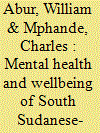|
|
|
Sort Order |
|
|
|
Items / Page
|
|
|
|
|
|
|
| Srl | Item |
| 1 |
ID:
173787


|
|
|
|
|
| Summary/Abstract |
The majority of South Sudanese-Australians arrived in Australia, and other host countries outside Africa, after spending a greater part of their lives in refugee camps or conflict-affected areas. In addition, refugees are often not able to return to their home countries because the causes of their departure (wars, insecurity, hunger) continue to apply in their country of origin. The purpose of this paper is to examine some of the mental health and wellbeing issues some South Sudanese-Australians experience as a result of settlement difficulties and their earlier experience of conflict. The study looks at experiences of resettlement and settlement difficulties, and, more importantly, mental health and wellbeing issues in the wake of the aforesaid challenges. The data was collected from a qualitative method which comprised a series of semi-structured, one-on-one interviews with a total of 20 South Sudanese-Australians living in Melbourne. There were 11 males and nine females, with ages ranging from 18 to 64 years, who volunteered to participate in this study. Findings indicated that, as with many other people from refugee backgrounds, South Sudanese-Australians face a range of settlement-related challenges, and a host of post-resettlement adaptation experiences such as limited change of gender roles, language proficiency, unemployment, host society unacceptance or intolerance, constrained recreational opportunities, lack of community connectedness and overall mental health and general wellbeing issues. Experiencing conflict can be traumatic and refuge in neighbouring countries that are socio-culturally different can be challenging. In conclusion, these issues can not only be troublesome on a day-to-day basis, but also adversely affect the long-term mental health and wellbeing of refugees.
|
|
|
|
|
|
|
|
|
|
|
|
|
|
|
|
|
|
|
|
|